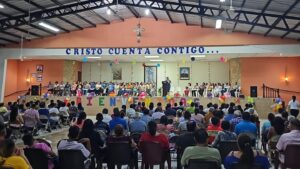It is said that once, a secular missionary arrived to India and he was in charge of care for the sick in a small dispensary. One day, a little boy, who needed to be treated, came into the place. The missionary, smiling, welcomed him and invited him to sit down. When the child looked at him, he was very surprised: it was the first time he found someone that way; clean and different from anything he had ever seen. The missionary made him feel special: as he was the first, the last and the only one he was going to care of. He cleant his wound, bandaged it and, when he finished he offered him something to eat. Before leaving, he gave him a religious card with the prayers of St. Francis Xavier and asked the young man to pray for him. The child was astonished. The first thing he did when he left the sickroom was asking a nun who was that man that had worried about him and left his life in his prayers and she answered, without paying much attention to him, that he was a secular. The boy could not believe it. A secular had taken care of him. He had never felt more important. When he arrived at the orphanage, he could not stop telling everybody: I have met a secular! When the nuns heard him, they could not stop smiling at the child’s innocence. Finally. They sat him down and explained to him what a secular was. The boy listened to them undaunted and at the end, he replied: When I grow up, I will be a secular.
After the Second Vatican Council, there was a rediscovery of the secular’s role as full part of the church. It was a reencounter with our right and duty, in a secular context, to practice our mission as Jesus Christ’s apostles. Fermenting the spaces where God has called us to life our lives as christians. It shoud be noted that, before this event, and in a painful way, we were called to be the biggest Flock in the broadest sense of the world. At the Council we were recognised, by our baptism and subsequent confirmation, as having a priestly, prophetic and royal function in Jesus Christ. And although the Second Vatican Council made clear the duty and the right of the secular to proclaim the Gospel also by word, what was received from the Council, was that the secular should transform its reality through its commitment and example of life, without emphasising the role of the secular as communicators of the Christian proclamation.
Thank God all this has changed over the years, although I have to say not as much as we would have liked. Since the Council, the Popes have been repeating over the last decades that the new evangelisation will be done by the precious collaboration of the secular or it will not happen. Urging the secular to become aware of this indispensable role: the rediscovery of our secular prophetism.
In these days, Pope Francis has once again questioned us, pastors and secular faithful, about the coresponsibility for evangelisation in the Church. “A path, marked out by God, to live more intensely and concretely in communion in order to overcome the long-established barriers that separate the clergy from the secular, the Roman Curia from the particular Churches, the Charismatic Movements from the parishes”. It is clear that this is a long road and that there is still a long way to go for the Church to live as a true mystical body of Christ. A body united in mission and incarnated as holy and faithful People of God, as Paul VI himself affirmed in “Lumen gentium”, back in 1965.
We are all called to share the same misión: to work for a world where God is manifested through each one of his children. This understanding of the Church should bring pastors and secular together to work for a common purpose, manifesting the complementarity of the different charisms of the Church. As did St. Paul, who always carried out evangelisation together with others, never alone. It also happened in the same way in the great momentos of the great renewal and missionary impulse in the history of the Church. Pastors and lay faithful together, as one people evangelising.
For this evangelising co-responsibility, it is indispensable to work on the formation of the secular. And this must be oriented above all towards the mission to which we are called: a living and lived mission. Incarnated in each one of us so that we do not fall into ideologies that lead us simply to theorise about our faith and not to feel it as something essential in our daily life. This formation must be born from listening to the kerygma and be nourished by the word of God and the sacraments. All this will help us to grow in personal and communal discernment, it will involve us immediately in the apostolate and in various forms of witnessing: a witness based on our own experience, on our own history, a prayerful witness. Bringing our witness of life closer to those who need us, closer to the poorest, to those who are alone. This is how we form ourselves for the mission: by going out to meet others. By working in formation on the ground and, at the same time, by living an effective path of spiritual growth.
Today’s world needs an integral ecclesiology as was the case at the birth of the Church where everything was unified by belonging to Christ and supernatural communion in Him and with the brethren. To do this, we must overcome this sociological, pyramidal, archaic vision of the Church, which, at bottom, is nothing more than giving form to the power assigned to each category that makes us up. We have to realise that this world in which we live is becoming increasingly secularised, so we must distinguish ourselves in this world, as the People of God, by our faith in Christ, not by the state of life or the vocation to which we have been called. We are baptised, Christians, disciples of Jesus. Everything else is secondary. Our common belonging to Christ makes us all brothers. Brothers with Christ, brothers with the priests, brothers with all.
That is why the laity are called to be men and women of the Church in the heart of the world and men and women of the world in the heart of the Church. We, secular people, are not just “guests” in the Church. A Church where the secular is a secular and the priest is a priest. Without clericalism and secularism. A Church oriented towards mission, where forces are united and we walk together to bring others closer to Christ; a Church where our baptism unites us as an authentic cord of faith; a Church where true fraternity is lived and where we work every day, side by side, in all areas of pastoral work. To sum up, a Church where pastors and secular walk together towards a new Pentecost.
Raúl González.






